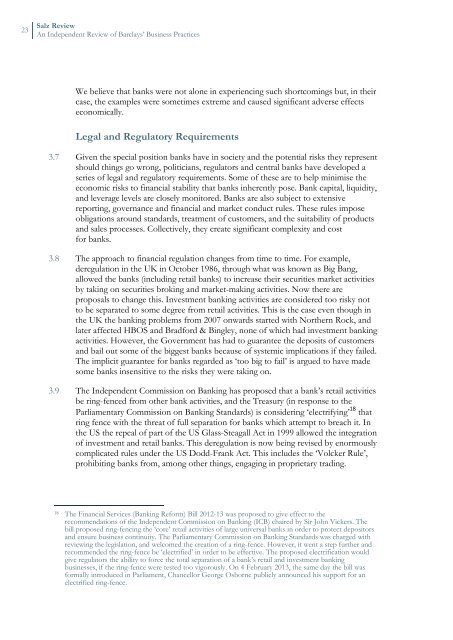Salz Review - Wall Street Journal
Salz Review - Wall Street Journal
Salz Review - Wall Street Journal
Create successful ePaper yourself
Turn your PDF publications into a flip-book with our unique Google optimized e-Paper software.
23<br />
<strong>Salz</strong> <strong>Review</strong><br />
An Independent <strong>Review</strong> of Barclays’ Business Practices<br />
We believe that banks were not alone in experiencing such shortcomings but, in their<br />
case, the examples were sometimes extreme and caused significant adverse effects<br />
economically.<br />
Legal and Regulatory Requirements<br />
3.7 Given the special position banks have in society and the potential risks they represent<br />
should things go wrong, politicians, regulators and central banks have developed a<br />
series of legal and regulatory requirements. Some of these are to help minimise the<br />
economic risks to financial stability that banks inherently pose. Bank capital, liquidity,<br />
and leverage levels are closely monitored. Banks are also subject to extensive<br />
reporting, governance and financial and market conduct rules. These rules impose<br />
obligations around standards, treatment of customers, and the suitability of products<br />
and sales processes. Collectively, they create significant complexity and cost<br />
for banks.<br />
3.8 The approach to financial regulation changes from time to time. For example,<br />
deregulation in the UK in October 1986, through what was known as Big Bang,<br />
allowed the banks (including retail banks) to increase their securities market activities<br />
by taking on securities broking and market-making activities. Now there are<br />
proposals to change this. Investment banking activities are considered too risky not<br />
to be separated to some degree from retail activities. This is the case even though in<br />
the UK the banking problems from 2007 onwards started with Northern Rock, and<br />
later affected HBOS and Bradford & Bingley, none of which had investment banking<br />
activities. However, the Government has had to guarantee the deposits of customers<br />
and bail out some of the biggest banks because of systemic implications if they failed.<br />
The implicit guarantee for banks regarded as ‘too big to fail’ is argued to have made<br />
some banks insensitive to the risks they were taking on.<br />
3.9 The Independent Commission on Banking has proposed that a bank’s retail activities<br />
be ring-fenced from other bank activities, and the Treasury (in response to the<br />
Parliamentary Commission on Banking Standards) is considering ‘electrifying’ 18 that<br />
ring fence with the threat of full separation for banks which attempt to breach it. In<br />
the US the repeal of part of the US Glass-Steagall Act in 1999 allowed the integration<br />
of investment and retail banks. This deregulation is now being revised by enormously<br />
complicated rules under the US Dodd-Frank Act. This includes the ‘Volcker Rule’,<br />
prohibiting banks from, among other things, engaging in proprietary trading.<br />
18 The Financial Services (Banking Reform) Bill 2012-13 was proposed to give effect to the<br />
recommendations of the Independent Commission on Banking (ICB) chaired by Sir John Vickers. The<br />
bill proposed ring-fencing the ‘core’ retail activities of large universal banks in order to protect depositors<br />
and ensure business continuity. The Parliamentary Commission on Banking Standards was charged with<br />
reviewing the legislation, and welcomed the creation of a ring-fence. However, it went a step further and<br />
recommended the ring-fence be ‘electrified’ in order to be effective. The proposed electrification would<br />
give regulators the ability to force the total separation of a bank’s retail and investment banking<br />
businesses, if the ring-fence were tested too vigorously. On 4 February 2013, the same day the bill was<br />
formally introduced in Parliament, Chancellor George Osborne publicly announced his support for an<br />
electrified ring-fence.
















